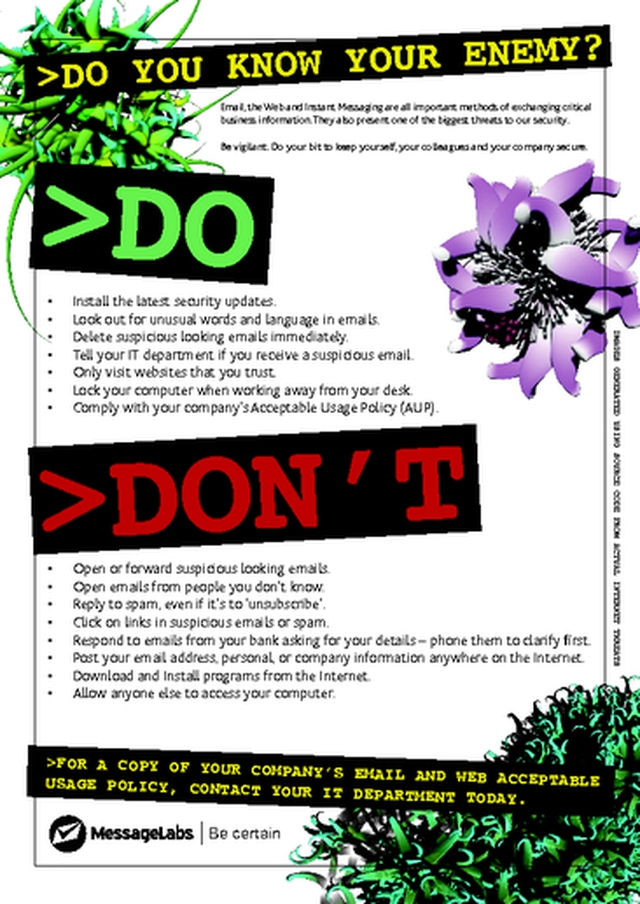Computer Security Guidelines

Given the recent spate of email scams experienced by some of our clergy, our IT department has pulled together some useful advice about how to avoid threats to your computer security.
This poster from MessageLabs provides a useful summary of how to stay safe.
Click here to print a copy of the poster.
Further advice is outlined below.
Internet safety guidelines from the diocesan IT department
Reduce the risk - avoid free email accounts
Some clergy in the diocese use a free email account. If you do use a Hotmail/Gmail/free email account, then it is recommended that passwords are changed frequently and that address contact lists are stored away from online email accounts, or that you make a copy of any address list you keep there. Having said that, the bottom line is that if you are an office holder and use a free email account as your public contact email then you are at greater risk, as you are very attractive to hackers because you know lots of people.
The most secure method is to use the email account provided by your internet provider and keep a private and public email address. You can use these with programmes such as Outlook which allow you to keep a copy of addresses/email on your PC (synchronised to your email account via pop3 or Imap).
Parishes and clergy can buy Outlook and Office 10 through Phoenix software very cheaply via www.parishbuying.org.uk
If you don’t want to use the one provided by your Internet service provider, try buying a domain name with an email facility. For £40 a year you can get a unique domain name & email, often with free software. This means, should you ever change Internet service provider, then you simply keep the same email. Most of these accounts have multiple addresses that you can use for different purposes such as parish, family, social networking. You can then keep tabs on all your accounts through Outlook. Here is an example of a paid for standalone account http://www.fasthosts.co.uk/domain-names/
Protection and Security
Buy and run good quality Anti-Virus systems such as McAfee, Norton, AVG or Kaspersky. Microsoft do a free one but the Firewall is not good, as it uses Windows Firewall.
Most sell three-licence packages but AVG do sell per licence, which is good for a single PC.
Do not listen to those which have a list of free bits of programmes, as they may clash or not work at all.
Most domestic computer users set themselves up as an Administrator. Administrators can install things. NEVER, EVER, connect to the Internet logged on as an Administrator (unless you specifically want to install something). Create another User with “Standard” access and use that logon for surfing. That logon cannot install anything, so provides a bit more protection against inadvertently installing something nasty.
Backup
BACKUP is vitally important!
Copy documents, address books, emails, photographs and even programme files to DVD. Do it at least once per month.
(By all means copy to memory sticks and portable hard drives too – but these are not as permanent as a DVD kept in an envelope).
Store the DVD somewhere else far away. Backups are useless kept next to your computer when the burglar comes, or the building burns down.
Be vigilant
When connected to the Internet, the world is out to get you. Your computer is under constant attack.
Only accept downloads from the software creator - beware of malware (malicious software). Read more...
Suspect anything unexpected.
Read all the attached warnings!
Diocesan IT use policy
Further guidelines can be found in the diocesan IT use policy document.
Further advice from the diocese
Please contact Ian Gapp (tel: 023-9289 9669/07710 288275), Regional IT Manager, with any queries or for further advice.